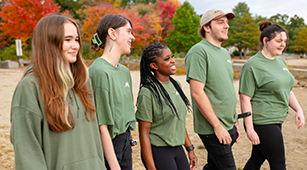Schedule an appointment to meet with Career & Experiential Learning about your area of interest.
Make an Appointment- Report Discrimination, Harassment, or Retaliation
- Get Help Now
- Recognizing & Understanding Sexual Harassment/Assault
- Recognizing & Understanding Intimate Partner Violence
- Recognizing & Understanding Stalking
- Resources (Sexual Misconduct)
- Reporting Incidents
- Preventing & Responding
- For Friends and Family of Victim-Survivors
- Sexual Harassment and Discrimination Policies and Laws
Curry College prohibits all forms of sexual misconduct, including sexual harassment, sexual assault, intimate partner violence, and stalking. Unfortunately, these are important issues in every college community, and Curry College is no exception. Sexual misconduct affects all members of our community, both as victim-survivors and as friends and family of victim-survivors. This section of our website provides information about our community-wide efforts to prevent and respond to all forms of sexual misconduct.
Other areas of this website address resources (including confidential resources), sexual harassment/assault, intimate partner violence, stalking, and reporting incidents. While this webspace offers specialized information and resources on these behaviors, we know, that sexual harassment/assault, intimate partner violence, and stalking often occur together. Because all of these behaviors may occur within one relationship, we encourage you to browse the website thoroughly and use whatever resources and information seem most appropriate to a particular situation.
If you would like to learn more about organized prevention and response efforts at Curry College, contact the college's Title IX Coordinator.
Curry College is committed to preventing all forms of sexual assault/harassment, intimate partner violence, and stalking. As a community, we pursue this by fostering a campus environment where everyone is empowered to keep the community safe and where students understand and demonstrate effective consent.
Collaborations between the Dean of Student's office, Public Safety, Wellness Education, the Athletics Department and others are bringing awareness and education about positive, bystander intervention. Bystanders are individuals who witness emergencies, criminal events, or situations that could lead to criminal events and by their presence may have the opportunity to provide assistance, do nothing, or contribute to the negative behavior. By recognizing that each member of the community has an opportunity to be a pro-social bystander, meaning individuals whose behaviors intervene in ways that impact the outcome positively, we reinforce the commitment that everyone can play an active role in prevention.
When we talk about sexual assault, harassment, intimate partner violence, and stalking, it's important to be clear that the responsibility for these appalling acts lies clearly with the person who commits them. Nothing than any victim-survivor or bystander does ever tips the balance away from that fact. As a community striving to prevent violence and harm, it's important that we also focus on the things we can do to increase safety for everyone.*
Bystanders are individuals who witness emergencies, criminal events, or situations that could lead to criminal events and by their presence may have the opportunity to provide assistance, do nothing, or contribute to the negative behavior. Bystanders can be powerful forces in passively allowing violence to occur, or they can be the force that prevents violence in our communities.
There are three basic ways to intervene†:
- Directly address the situation: You can do this by asking "Who did you come here with?", "How do you know each other?", or "Would you like me to stay here with you?
- Distract the people involved so that the situation stops: You can do this by suggesting people go somewhere else ("Let's go get some pizza!") or do something else ("Anyone want to play a game?") or bring out food.
- Delegate, by getting other people to help you: You can do this by asking friends of the person to check in on them, by talking to an authority figure, or by getting a group of people to join you.
Some tips for being a pro-social bystander:
- Sexual, sexist, and homophobic jokes and language increase the risk of violence in our community because they diminish the importance of creating a safe environment. Step in and address it when someone jokes about "being raped" by a test or something "being so gay" or other similar phrases.
- Call police or someone else in authority.
- Tell another person. Being with others is a good idea when a situation looks dangerous.
- Yell for help.
- Ask a friend in a potentially dangerous situation if they want to leave and then make sure that they get home safely.
- Ask a victim-survivor if they are okay. Provide options and a listening ear.
- Call on confidential resources for support and options.
*This paragraph and other information on this page is adapted from University of New Hampshire's Bringing in the Bystander program, unless otherwise noted.
†Specific examples adapted from RAINN.org
When we talk about sexual assault, sexual harassment, intimate partner violence, and stalking, it's important to be clear that the responsibility for these acts lies clearly with those who commit them. Nothing that any victim-survivor or bystander does ever tips the balance away from that fact. As our community strives to prevent and respond to violence, however, it's important to focus on the things that we can all do to keep ourselves and others safe.*
The information on this page is focused on staying safe during in-person encounters. Read more about increasing safety online.
In Our Community**:
Whether or not you see an assault in progress, every member of our community can help reduce risk by being an engaged bystander.
- When you hear comments that trivialize rape, sexual assault, and other forms of sexual misconduct, intervene and explain that these topics should never be treated lightly. Explain that victim-survivors may hear such jokes as making fun of their trauma and that those who might perpetrate sexual misconduct may hear such jokes as acceptance of sexual misconduct in our community.
- Pay attention to messages in pop culture and other media. Consider how these messages impact women, LGBTQ people, people of color, and others who are disproportionately affected by sexual misconduct.
- Remember that statistics indicate that in any room, victim-survivors are likely to be present. As a community, we should discuss these important issues, and we should do it with care for everyone present.
Learn more about how to intervene to stop sexual misconduct in progress.
For Partners+
- Show your potential partner respect if you initiate sexual behavior. If a potential partner is not providing effective consent, accept it and don't push.
- Clearly communicate your intentions to your potential sexual partner, and give them a chance to share their intentions and/or boundaries with you.
- Communicate when you change sexual activity by asking, "Is X okay?" or something similar.
- Respect personal boundaries. If you are unsure what's OK in any interaction, ask. Don't make assumptions about consent. If you have questions or are unclear, assume you don't have consent.
- Don't take advantage of the fact that someone may be under the influence of drugs or alcohol, even if that person chose to become that way. Others' loss of control does not put you in control.
To Reduce Your Own Risk++
- Make arrangements to travel with friends to reduce vulnerability.
- Use others around you, including friends, family, or police. They may be waiting for a signal that you would like help.
- Trust your intuition,, and don't hesitate to call for help or leave if you're feeling uneasy.
- Communicate as clearly as possible about which activities are comfortable for you and which are not.
- Alcohol and other drugs can impair your ability to understand what is occurring. In the context of sexual assault, this means that alcohol may make it easier for a perpetrator to commit a crime and can even prevent someone from remembering that the assault occurred. Using alcohol and drugs does not cause sexual assault, stalking, or intimate partner violence, but moderating your use can help you quickly respond to reduce your risk and improve your safety.
If Someone is Pressuring You to Engage in Sexual Activity*
If someone is pressuring you to engage in sexual activity, it may be uncomfortable or frightening. Perpetrators often use this tactic. It is not your fault the other person is doing this. Here are some tips for exiting that situation safely.
- Remind yourself this is not your fault.
- Trust your gut. It doesn't matter why you don't want to do something. If you are not interested, that is reason enough.
- Consider developing a code word with friends or family. It could be something as simple as, "I would rather have lemonade than iced tea." This can tell people who care about you that you want help getting away from someone.
- If lying will help you leave, it's okay to lie. You can say that someone is expecting you or that you don't feel well or that you need to go to the bathroom. Staying safe is more important than being honest with someone who is pressuring you.
- Think of a way out. Look for windows, doors, or people to help you safely leave a space.
*Adapted from the University of New Hampshire's Bringing in the Bystander website.
**Portions of this list are adapted from Men Can Stop Rape.
‡Adapted from University of New Hampshire's Bringing in the Bystander website, the CDC, ATIXA, and RAINN.org
†Adapted from ATIXA.
♦Adapted from RAINN.org.
Intimate partner violence is not the fault of the person receiving the abuse, nor is the person being abused responsible for making it stop. Those responsibilities lie with the person who is abusing their partner. Those receiving abuse can, however, choose to take some steps to increase their safety and well-being and may want to do so, whether they are staying with their partner, leaving, or have already left.
If you or someone you know is in an abusive relationship, safety planning is important. Whether the person is leaving the relationship or staying in it, safety planning can help make decisions and determine resources before an abusive incident starts. That way, if abuse happens, the person can quickly get to a safer situation.
To read about specific suggestions for safety planning online and in social media, visit our page on increasing safety online, found here. There are several websites for safety planning.
Here are some safety planning basics*, which can vary depending upon living situation, employment situation, and financial situation. Remember, you can always contact the resources found here, for help.
Safety Planning Basics
- Make your plan ahead of time and keep a copy in a safe place. Consider giving a copy to someone you trust and can reach easily.
- Think about the safest ways to get to school, work, home, and other places you need to go.
- Think of a safe place you can reliably and quickly go if your abuser appears at school, work, or home. Emergency rooms and police stations might be places you can go quickly to be safe immediately.
- Write down the phone numbers for friends, family, or emergency resources you would call.
- Put together a bag with important items like your phone, some money, keys, ID, important papers (birth certificate, immigration papers), change of clothes, medications, and anything else you might need for a few days or to access legal services. If you have children or pets, pack for their needs too. Keep the bag somewhere safe and easily accessible.
- Think of activities you can do when your abuser causes you to feel bad or lonely. Taking care of your emotional safety is important too.
- Consider who you can tell about this plan and how they can help you stay safe by doing things like checking in regularly, not telling your abuser where you are, and not posting your location on social media.
- Even if you don't plan to involve authorities, keep a record of incidents of abuse, including dates, what happened, and any emails, text, or other communication.
If you are planning to end an abusive relationship, there are some other steps you can take to increase your safety. The decision to leave an abusive relationship can be very important and healthy, and you should end such a relationship carefully. Ending an abusive relationship is different than ending a healthy one, because your former partner may not respect the boundaries you want to create. They may try and make you feel guilty. Consider these suggestions for making the break-up work for you.*
Preparing to Break Up
- If your relationship separated you from other friends and family, try to connect with those people again. They can be helpful support as you end your relationship.
- You may miss your partner after you break up. That's normal, but it can be helpful to write down why you chose to end the relationship so that you can look back at that list if you are reconsidering.
- Ending any relationship is overwhelming and making decisions after abuse can add to that. Reach out to confidential resources found here, and other aspects of your support system.
Ending the Relationship
- If you don't feel safe, don't break-up in person. It may seem unkind, but breaking up over email or phone may be safest.
- Break-up in a public space with friends or family waiting nearby. Take your cell phone with you.
- Don't try to explain your reasons for ending the relationship more than once. There's nothing you can say that'll make your ex happy.
- Let your friends and parents know you are ending your relationship, especially if you think your ex will come to your house or confront you when you're alone.
- If your ex does come to your house when you're alone, don't go to the door.
- Trust yourself. If you feel afraid, you probably have a good reason.
- Ask for help. Contact the confidential resources found here for help any time.
After Breaking Up
Unfortunately, ending an abusive relationship does not automatically make you safe. Follow these steps to keep yourself safe after a break-up.
- Talk with your friends, family, and resources so they can support you.
- If you can, tell your parents what's going on, especially if your ex may come by your home.
- Consider talking to the Title IX Coordinator, (contact info found here) who can help with adjusting your class schedule, living assignment, or other logistics.
- Avoid isolated areas at school and local hangouts. Walking with friends and keeping earphones out of your ears will decrease your vulnerability.
- Keep friends or family close when attending parties or events you think your ex might attend.
- Save any threatening or harassing messages your ex sends. Set your profile to private on social networking sites and ask friends to do the same.
- If you ever feel you're in immediate danger, call 911.
- Memorize important numbers in case you don't have access to your cell phone.
*Adapted from LoveIsRespect.org
If you or someone you know is being stalked, it can be frightening. People who are experiencing stalking often struggle with the best way to respond. It's important to note that stalkers are usually encouraged by any contact with the people they are stalking and that behaviors can escalate very quickly. What may initially seem annoying can become frightening and dangerous. For this reason, it's important to take stalking behaviors seriously.
Remember, you cannot control a stalker, and you are not responsible for their behavior. Stalking is not the fault of the person being stalked, nor is the person being stalked responsible for making it stop. Those responsibilities lie with the person who is stalking another person. Those experiencing stalking can, however, choose to take some steps to increase their safety and well-being and may want to do so.
You can take these steps* to help improve your safety and the safety of those around you.
- Develop a detailed stalking safety plan, working with a victim advocate. Include emergency phone numbers and safe places to stay other than your home. Your plan should also incorporate the tips below. Consider contacting confidential resources and a victim advocate who can help you develop a detailed plan.
- Rely on people you trust to reduce the impact stalking has on you. For example, can someone check your mail and help sort out mail from the stalker? Can someone else help you gather and maintain evidence in case you decide you want to report the stalking? Using trusted people in the roles will help you and keep you connected to important people.
- Maintain a log of all interactions with or from the stalker. This will be helpful if you want to pursue a report to Curry College and/or to law enforcement.
- Try to keep a phone nearby at all times, ideally one to which the stalker does not have access.
- Treat all threats as serious and contact law enforcement.
- Try to vary your routines so that your activities are not predictable.
- Try to minimize time you are alone.
- Get a new and unlisted phone number. Leave the old number active and connected to voicemail for the purpose of gathering evidence.
- Do not interact with your stalker. This generally encourages stalkers to continue.
- Considering getting a legal protective order.
- Inform neighbors, friends, and family about the situation and show them a picture of your stalker. Ask them to report to the police if this person appears.
- Make sure that schools, businesses, and offices do not provide your contact information to anyone.
- If you have children or others who depend on you, be sure they know when and how to leave an unsafe situation and a safe person to contact.
*Adapted from the Stalking Resource Center and WomensLaw.org
More and more, people are starting relationships online or communicating online in their current relationship. Social media and other online communication are great tools, but they can also make it easier to stalk or abuse someone, including a partner.
This page provides information about increasing safety for yourself and your friends in online interactions.
Online abuse and stalking is not the fault of the person receiving the abuse, nor is the person being abused responsible for making it stop. Those responsibilities lie with the person who stalks or causes other harm. Those receiving abuse can, however, choose to take some steps to increase their safety and well-being and may want to do so.
Increasing Your Own Safety*
- Keep your passwords private. Do not share them with your partner or anyone else.
- Think carefully about what you post, and talk to your friends about what you want them to post and keep private. Avoid posting your email address, phone number, address, or schedule. These are all keys for people who want to track you.
- If you want to post about an event you attend, wait a couple of days. This will make it harder for someone to show up where you are when you don't want them to do so.
- Check your privacy settings to be sure that you are comfortable with the settings. Here is information on how to do that from the following social media sites: Facebook, Instagram, LinkedIn, Pinterest, Twitter.
- Turn off all requests for "access to your location." People can use this to determine where you are.
- Don't respond to abuse online, but do report it. All social media providers allow you to report harassment online.
- Keep a record (including screen shots) of any online abuse. Read more about gathering evidence .
- If your partner is abusive and has access to your devices, learn more about browsing safely to minimize what your partner sees.
- Especially if you are leaving an abusive relationship, consider deactivating your account or doing a "super log-off" (deactivating your account when you are not actively on it). This will mean people cannot post about you during this time.
- If you are meeting in-person with someone you met online, pick a public place to meet, tell a friend or family member about your plans, make a plan for how you'll get home safely, and hold off on revealing personal information. You can also look up the person online and verify information they've shared.
Helping Friends Stay Safe†
- Always ask for permission before you post about someone else or tag them. If you don't have permission, don't post it.
- Especially do not post someone else's location. If you want to post about an event you attended together, wait until the event has been over for a day or more.
- Respect any limits that your friend wants to set on their social media use or connections.
- Ask your friend if they would like you to save texts or emails they have sent about their relationship.
*Adapted from RAINN.orgLoveIsRespect.org
†Adapted from LoveIsRespect.org





